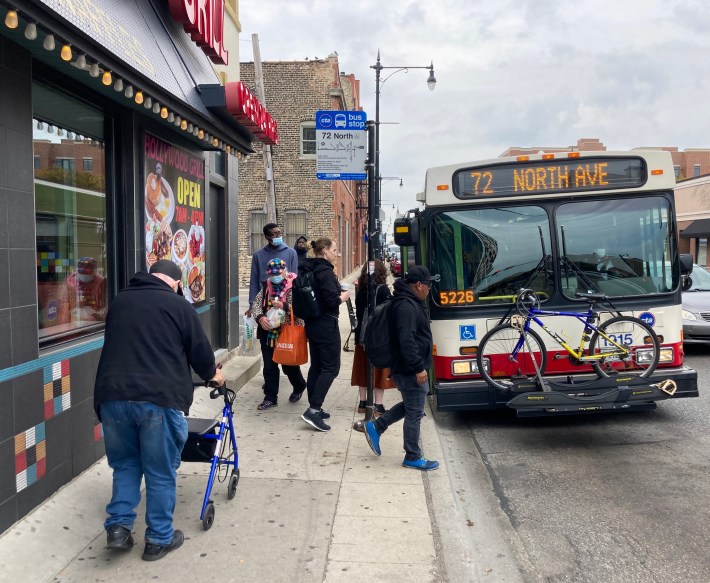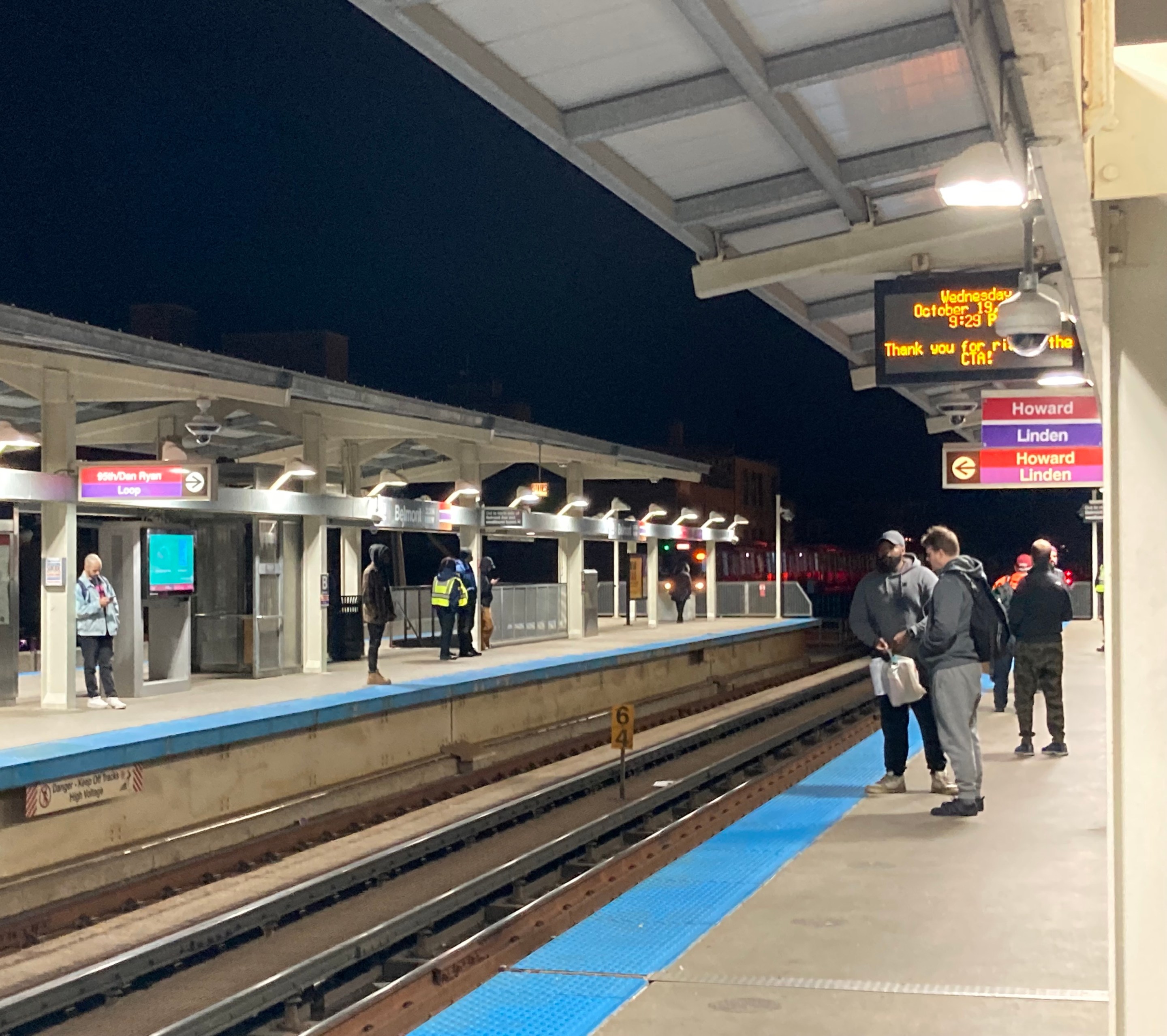CTA rider confidence is currently at a low point. Due to COVID-related staffing shortages, bus and train runs are often skipped, leading to longer, less predictable wait times. For example, the advocacy group Commuters Take Action analyzed transit data and found that on Wednesday only 65 percent of scheduled Blue Line runs actually materialized.
Adding insult to injury, predicted arrival times on on the CTA Train Tracker website, platform displays, and various apps are based on a mix of real-time data and scheduled trips, and most riders don't know how to tell the difference. (Tip: A Wi-Fi wave icon next to an arrival time means it's real, while a clock icon means it's scheduled, and therefore merely hypothetical, as you can see in the photo below.) So they often have the profoundly frustrating experience of waiting for a run that has appeared on a screen, only to have it vanish from the screen before the predicted arrival time.
We did a Freedom of Information Act request to try to find out why CTA president Dorval Carter ghosted his own 9/14 City Council hearing on poor transit service, infuriating advocates and alders. CTA once again used a loophole to simply black out the relevant info. 🤬@CDRosa pic.twitter.com/lasKjeyk9Z
— Streetsblog Chicago (@streetsblogchi) October 18, 2022
Carter's bizarre behavior aside, the CTA budget projects that ridership will continue to rebound next year, rising by about 9 percent over 2022 ridership. "To ensure that CTA meets that demand, the agency continues an aggressive, comprehensive recruitment program to address the biggest issue impacting service: attracting and retaining workers, especially frontline employees like bus and rail operators," the agency said in a news release.
The CTA hosted eight job fairs in 2022 and hired dozens of new workers, but says it's still a thousand workers short, including about 100 train operators and 650 bus drivers. The new budget would bump up labor expenditures from $1.24 billion in 2022 to $1.28 billion next year. The agency projects that it would continue to spend more on labor in 2024 ($1.32 billion) and 2025 (1.37 billion), according to a Sun-times report.
The CTA is also increasing the funding for security from $26 million this year to $41 million in 2023, the Chicago Tribune reported. This includes cash for unarmed security guards, dog patrols, and a program to hire off-duty Chicago cops to work in the transit system.
The agency also promised that it is tweaking the algorithms on the Transit Trackers to make them more accurate, and cited recent upgrades to the Bus Tracker website.
According to the CTA, American Rescue Plan funding will help bridge an estimated $390 million budget gap in 2023. It's unclear what the transit agency will do when the federal stimulus cash dries up in the future, which the CTA expects to happen in 2025, a potential fiscal cliff.
The CTA also released its $3.4 billion 2023-2027 Capital Improvement Program, which is separate from the operating budget. This includes money for the Red Line extension, which people have been asking for since the Nixon era.
The capital plan also includes
- All Stations Accessibility Program, to make to make all 'L' stations ADA accessible
- Expansion of the electric bus fleet, with the goal of electrifying the entire fleet by 2040
- The Refresh & Renew program, which covers short-term improvements to train stations
- Better Streets for Buses, a plan for (modest) bus corridor improvements across the city
Questions the news release release raises include just how well are the station accessibility upgrades are going. And why is there no discussion of future route and line planning, aside from the Red Line extension?
More information on the proposed 2023 budget is available here.

How to provide input on the budget
A virtual public hearing will be held at 6 p.m. November 10, 2022. The CTA says that "due to health concerns" there will be no in-person hearings, although this is probably more an issue of cost and convenience for the agency.
A link to view the hearing will be available at transitchicago.com/finance. Residents who want to speak at the virtual public hearing can submit their request prior to the hearing. Options for providing comment at the virtual hearing or for submission to the Chicago Transit Board on the proposed 2023-2027 Capital Program of Projects, 2022 Operating Budget and Program, and the Financial Plan for 2023 and 2024 are detailed below. (The following is the agency's language.)
WRITTEN STATEMENTS: Written statements will be taken into consideration prior to the adoption of the proposed 2023-2027 Capital Program of Projects, 2023 Operating Budget and Program, and Financial Plan for 2023 and 2024. Written comments for the Chicago Transit Board’s review and consideration must be submitted by 5 p.m. Tuesday, November 15, 2022. Written comments may be submitted in any of the following ways:
- Via US Mail, CTA Board Office, 567 W. Lake Street, 2nd Floor, Chicago, IL 60661
- Via drop off at CTA Headquarters, 567 W. Lake Street, 1st floor mailroom
- Via fax at 312-681-5035
- Via email at GLonghini1@transitchicago.com
ORAL STATEMENTS: Members of the public who wish to speak at the virtual public hearing are encouraged to register prior to the hearing, by completing and submitting a Request to Speak form online at transitchicago.com/finance. Individuals registered online by Wednesday, November 9, 2022, the day before the hearing, will be called by the CTA, at the telephone number provided, during the November 10, 2022 hearing, to be connected to the virtual public hearing proceedings.
DIAL IN AT THE TIME OF THE HEARING: Members of the public may also dial-in, while the hearing is in progress, to request to speak, by calling 312-681-3091. Individuals who pre-register to speak will be taken up first at the virtual public hearing. Individuals who call while the hearing is in progress will then speak in the order that they call in.
At the virtual public hearing the CTA will afford an opportunity for interested persons or agencies to be heard with respect to social, economic, environmental and other related aspects of the proposed 2023-2027 Capital Program of Projects, 2023 Operating Budget and Program, Proposed Fare Reductions and the Financial Plan for 2023 and 2024.
At the virtual public hearing, an American Sign Language interpreter and a Spanish interpreter will be provided. Individuals with disabilities who require other accommodations to review the budget or to provide feedback should contact Gregory Longhini, Board Secretary, at GLonghini1@transitchicago.com, 312-681-5022 or Relay.





